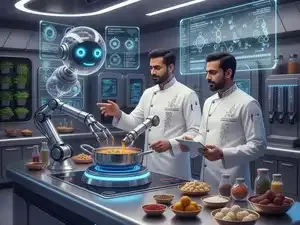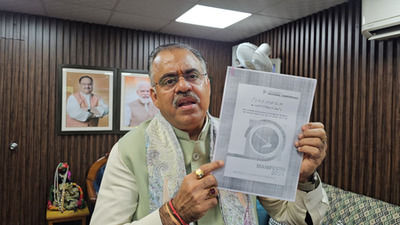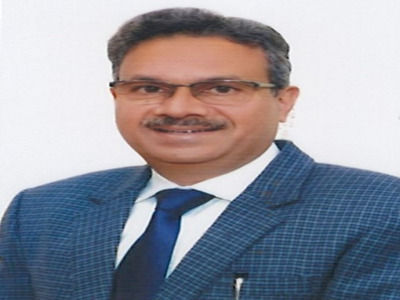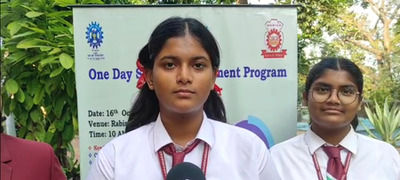What happens when artificial intelligence meets the art of cooking?
At IIIT-Delhi, professor Ganesh Bagler has been exploring that intersection for more than a decade, giving birth to what he calls 'computational gastronomy' -- a pioneering field that uses data science and AI to decode and recreate the science of taste.
"It all started as a curiosity-driven classroom exercise when I was teaching at IIT Jodhpur," Bagler recalled in an interview with PTI.
"We were studying patterns in global cuisines -- Indian, Italian, Mexican -- and I realised that no one really looked at food through the lens of data and computation. That's how the journey began, around 10 years ago."
Since then, Bagler's lab at IIIT-Delhi has been at the forefront of blending two seemingly contrasting worlds -- the artistic, cultural side of cooking and the quantitative precision of data science.
"No one had tried to merge these two domains before," he said.
Over the years, Bagler and his team have built structured databases covering thousands of recipes, ingredients, nutritional values, and even the carbon footprint of food.
"We realised that good AI models depend on good data -- what we call the 'garbage in, garbage out' principle. So we created quality datasets to power meaningful analysis," he explained.
The team also developed algorithms that can predict how ingredients combine, identify healthier alternatives, and even generate new recipes that never existed before.
One of their most innovative creations is 'Ratatouille', an AI-powered recipe generation system inspired by the animated film of the same name.
"Given a few ingredients, our system can create new, culturally coherent recipes -- say, a Brazilian-style dish with Indian spices -- or even design meals rich in protein but low in calories," Bagler said.
The system, which can be accessed by logging into https://cosylab.iiitd.edu.in/ratatouille/, can also factor in dietary constraints for conditions such as diabetes or obesity, where diet plays a crucial role in health management.
But how does the system ensure that what it suggests is safe or palatable?
Bagler explained that the AI system learns from real, culturally-validated recipes.
"For instance, it knows from existing data that chilli in a dish would typically be one or two teaspoons, not 10. So it avoids toxic or impractical combinations," he said.
Currently available as a web-based research platform, the project is still evolving.
A published paper on Ratatouille is already out, with another in the pipeline.
"You can try it out and generate recipes based on your chosen ingredients and preferences," he said.
While AI is making inroads into art and music, Bagler believes food remains one of the most emotionally human experiences -- and that's exactly why it's exciting to bring AI into the kitchen.
"People often ask if AI will replace chefs. My answer is: AI will not replace a chef, but a chef using AI will replace one who doesn't," he said.
Bagler, who has been with IIIT-Delhi for nearly a decade, teaches courses on computational gastronomy, network science, and systems biology.
Through his work, he hopes to inspire a new generation of scientists who see food not just as nourishment, but as a complex, analysable system waiting to be reimagined.
At IIIT-Delhi, professor Ganesh Bagler has been exploring that intersection for more than a decade, giving birth to what he calls 'computational gastronomy' -- a pioneering field that uses data science and AI to decode and recreate the science of taste.
"It all started as a curiosity-driven classroom exercise when I was teaching at IIT Jodhpur," Bagler recalled in an interview with PTI.
"We were studying patterns in global cuisines -- Indian, Italian, Mexican -- and I realised that no one really looked at food through the lens of data and computation. That's how the journey began, around 10 years ago."
Since then, Bagler's lab at IIIT-Delhi has been at the forefront of blending two seemingly contrasting worlds -- the artistic, cultural side of cooking and the quantitative precision of data science.
"No one had tried to merge these two domains before," he said.
Over the years, Bagler and his team have built structured databases covering thousands of recipes, ingredients, nutritional values, and even the carbon footprint of food.
"We realised that good AI models depend on good data -- what we call the 'garbage in, garbage out' principle. So we created quality datasets to power meaningful analysis," he explained.
The team also developed algorithms that can predict how ingredients combine, identify healthier alternatives, and even generate new recipes that never existed before.
One of their most innovative creations is 'Ratatouille', an AI-powered recipe generation system inspired by the animated film of the same name.
"Given a few ingredients, our system can create new, culturally coherent recipes -- say, a Brazilian-style dish with Indian spices -- or even design meals rich in protein but low in calories," Bagler said.
The system, which can be accessed by logging into https://cosylab.iiitd.edu.in/ratatouille/, can also factor in dietary constraints for conditions such as diabetes or obesity, where diet plays a crucial role in health management.
But how does the system ensure that what it suggests is safe or palatable?
Bagler explained that the AI system learns from real, culturally-validated recipes.
"For instance, it knows from existing data that chilli in a dish would typically be one or two teaspoons, not 10. So it avoids toxic or impractical combinations," he said.
Currently available as a web-based research platform, the project is still evolving.
A published paper on Ratatouille is already out, with another in the pipeline.
"You can try it out and generate recipes based on your chosen ingredients and preferences," he said.
While AI is making inroads into art and music, Bagler believes food remains one of the most emotionally human experiences -- and that's exactly why it's exciting to bring AI into the kitchen.
"People often ask if AI will replace chefs. My answer is: AI will not replace a chef, but a chef using AI will replace one who doesn't," he said.
Bagler, who has been with IIIT-Delhi for nearly a decade, teaches courses on computational gastronomy, network science, and systems biology.
Through his work, he hopes to inspire a new generation of scientists who see food not just as nourishment, but as a complex, analysable system waiting to be reimagined.








